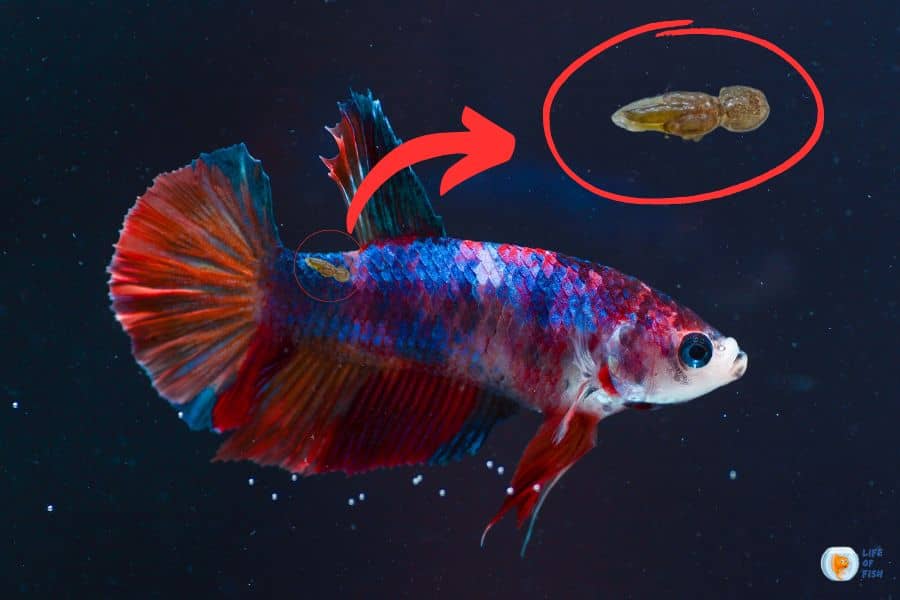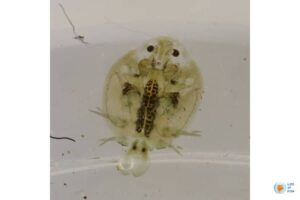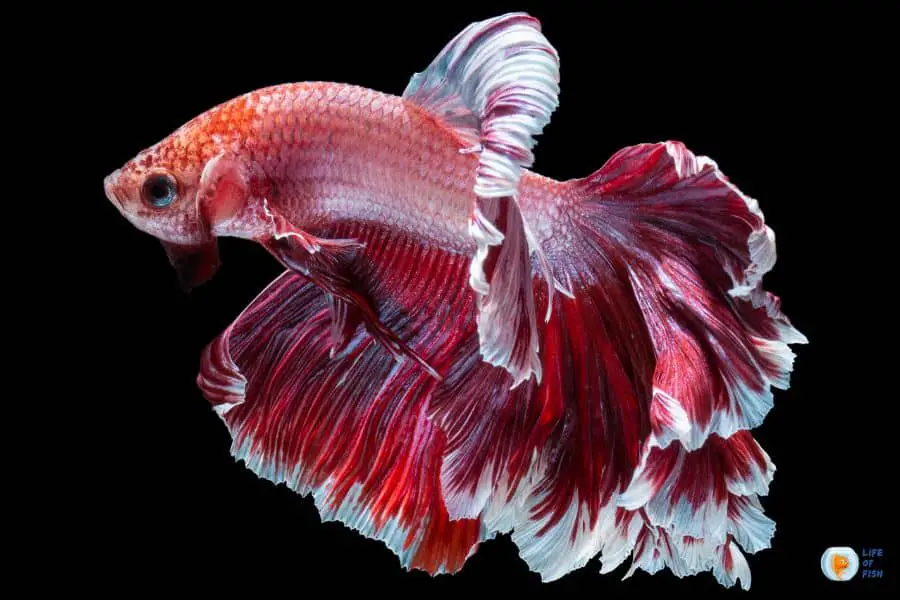If you’re a Betta fish owner, you know how much joy these little creatures can bring to your life. However, when your Betta fish falls sick, it can be a source of great worry and frustration. One common illness that Betta fish owners may encounter is Betta lice.

It is a tiny parasite that can wreak havoc on your fish’s health. In this blog post, we’ll dive deep into Betta lice, providing you with everything you need to know about identifying, treating, and preventing this pesky parasite. Whether you’re a seasoned Betta fish owner or just starting out, read on to learn more about Betta lice and how to keep your fish healthy and happy.
“Want to keep your Betta Fish thriving? Learn about the most common Betta Fish Diseases and how to prevent them by reading our guide here.” Betta Fish Diseases
What are betta lice
Jump To
Betta lice are tiny, crustacean parasites that feed on the blood of Betta fish. Unfortunately, these little critters can cause a lot of damage to your pet betta’s health if left untreated. That’s why it’s so important to learn about them and how to keep them away from your beloved fish.
The prevalence of Betta lice varies widely depending on where you live. For example:
- In the United States, it is estimated that up to 20% of all Betta fish owners have experienced infestations with Betta lice at some point in their lives.
- In Asia, where many Betta fish come from, up to 50% of Betta fish may be infected by Betta lice at any given time.
- In Australia, researchers have found that more than 90% of wild Betta populations may be affected by Betta lice.
These statistics paint a vivid picture of just how common Betta lice are – and how important it is for us to do our best to protect our Betta friends from them!
Identifying Betta Lice
You may not realize it, but your beloved Betta fish could be harboring parasites! Betta lice are tiny crustaceans that live on the skin of betta fish and feed on their blood. They can range in size from 0.25mm to 1mm and appear as small white or yellow specks. Here’s how to identify them:
- Look for whitish spots on the fish’s body.
- Examine the fins for signs of fraying or damage.
- Check for redness or inflammation around the gills.
- Look for an increase in scratching or rubbing against objects.
These small pests can cause a lot of harm if left untreated. Fortunately, there are many treatments available to help keep your Betta healthy, so don’t hesitate to reach out to a vet if you suspect lice infestation. By being proactive and taking care of your Betta, you can ensure they have a long and happy life!

Causes of Betta Lice Infestation
Have you ever wondered what might be causing those tiny black specks on your Betta fish? It could very well be a lice infestation, and understanding the common causes is key to ensure it doesn’t happen again. Here are three of the most likely culprits behind Betta lice infestations:
- Poor water quality – If the tank isn’t properly maintained through regular cleaning, poor water quality can easily become an issue.
- Overcrowding – Bettas need plenty of space to move around in their tanks; overcrowding increases stress levels and can lead to an outbreak.
- Introducing infected fish – If a new fish has been introduced to the tank, it’s important to make sure they’re not carrying any illnesses or parasites that may spread to other inhabitants.
Prevention is key when it comes to avoiding a lice infestation in your Betta tank. By keeping up with proper aquarium maintenance, monitoring the number of fish per gallon, and always quarantining before introducing new fish, you’ll have a much better chance at preventing this from happening. So, why risk it? Take the necessary steps now and keep your Betta tank healthy!
Symptoms of Betta Lice Infestation
Here, you can go into greater detail about the symptoms of Betta lice infestation, such as itching, red spots, and difficulty breathing. You should also discuss the potential long-term consequences of untreated infestation.
When it comes to Betta lice infestation, you might be experiencing some uncomfortable and concerning symptoms. From itching and red spots on your fish’s body to difficulty breathing, these signs won’t go away until the problem is solved. It’s important to take action sooner rather than later, as untreated infestations can lead to long-term consequences for your beloved pet. To get a better understanding of the situation, here are the common symptoms associated with Betta lice:
- Itching
- Red spots
- Difficulty breathing
If left untreated, Betta lice infestations can cause further issues such as:
- Poor water quality
- Stressful environment
- Reduced appetite
Treatment for Betta Lice
Treating Betta Lice is a must if your fish has been infested! Luckily, there are several viable options available to you. Here’s a 3-step guide on what treatments are most effective for getting rid of this pesky problem and how to administer them:
1) Medicated Baths – This treatment involves submerging your Betta in a tank filled with medicated water. To do so, add 1 teaspoon of aquarium salt or an over-the-counter medication per gallon of water. Leave your Betta in the solution for approximately 10 minutes before removing them from the tank and rinsing them off with clean, dechlorinated water.
2) Quarantine – If the lice infestation is severe, it may be wise to separate your Betta in a quarantine tank to prevent the spread of parasites to your other fish. Make sure that all living items are removed from the tank, such as gravel, plants, and decorations. Additionally, use an anti-parasitic food or medication before reintroducing your Betta back into their original habitat.
3) Chemical Treatments – Another option is to use chemical treatments like Melafix or Pimafix to treat the lice. These can be added directly to the water in your fish tank and will work to kill any existing parasites. It’s important to keep a close eye on your Betta during this process and make sure that they don’t show any signs of distress.
By following these steps, you should have no trouble eliminating Betta lice from your aquarium!

Preventing Betta Lice Infestation
Let’s face it, nobody wants these little critters taking up residence in their fish tank! But don’t worry – with a few simple steps you can keep your Betta lice-free. Here are my top 4 tips to help prevent an infestation:
- Keep your tank clean and well maintained. This is the foundation of any healthy aquarium.
- Quarantine new fish for at least 2 weeks before introducing them into your existing setup.
- Regularly monitor your Betta’s health. Check for signs of infection or parasites. If you see anything out of the ordinary, treat it promptly.
- Don’t skimp on quality food. Feeding your Betta high-quality food will ensure they’re getting the proper nutrition and vitamins they need to stay strong and healthy.
By following this advice, you’ll be able to enjoy your Betta without having to worry about those pesky lice invading their home!
Frequently asked question
Is fish lice harmful?
Yes, fish lice can be harmful to fish. They are external parasites that feed on the fish’s skin and tissues, causing irritation, inflammation, and potentially leading to secondary infections. If left untreated, fish lice can weaken the fish’s immune system and compromise their overall health.
Can fish lice spread to humans?
No, fish lice cannot spread to humans. They are specific to fish species and do not pose any threat to humans or other animals.
Can salt cure fish lice?
Yes, salt can be an effective treatment for fish lice. By adding salt to the aquarium water, you can create a hypertonic environment that will cause the fish lice to dehydrate and die off. However, it’s important to follow proper dosage guidelines and monitor the fish’s behavior closely, as too much salt can be harmful to the fish.
Other treatments, such as medicated baths or chemical treatments, may also be necessary for severe infestations. It’s best to consult with a veterinarian or experienced fishkeeper for advice on the most effective treatment for your fish.
How long do fish lice live?
Fish lice have a life cycle of about three weeks. The adult lice can live up to two weeks, during which time they lay eggs on the fish’s skin or tank decorations. The eggs hatch into larvae, which eventually mature into adult lice and continue the cycle.
What fish eats fish lice?
Several species of fish can eat fish lice, including Siamese fighting fish, guppies, and certain species of catfish. In addition, some aquatic invertebrates, such as snails and shrimp, may also consume fish lice. However, relying solely on natural predators to control fish lice is not always effective, especially in heavily infested tanks. It’s important to practice good aquarium hygiene, monitor the fish’s health regularly, and administer appropriate treatment if necessary.
Conclusion
In the end, it’s essential to remember that Betta lice infestation is a serious problem and should be taken seriously. We need to do our best to spread the word and make sure everyone who owns a Betta fish knows how to identify and deal with this issue:
– Educate yourself on the signs of an infestation:
- Look for small white specks or flakes floating in the water.
- Check the fins and scales of the fish for signs of irritation, redness, and inflammation.
- Examine all surfaces of the aquarium for signs of parasites.
– Have regular maintenance checks done on your tank:
- Clean and replace the filter media regularly.
- Keep up with water changes every week to maintain good water quality.
- Vacuum the substrate and gravel at least once a month.
By staying informed and taking proper precautions, we can help protect our beloved Betta fish from these dangerous pests.
Read Next: Betta Tumors: How to Identify, Treat, and Prevent Them
Read Next: Hospital Tank For Betta | Correct Setups |
